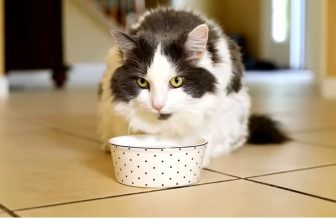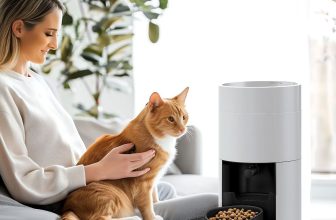Can Cats Eat Eggs? Discover the Benefits Safely

Can cats eat eggs? Yes, they can—and eggs are both safe and nutritious for cats. Eggs provide high-quality protein and essential nutrients that support feline health. Since cats are obligate carnivores, they benefit from meat-based foods like eggs. Rich in vitamins B12 and D, eggs help keep a cat’s coat shiny and skin healthy. They also contain healthy fats that boost energy. However, moderation is important. Eggs should be served cooked and only as an occasional treat, not as a meal replacement. Understanding how to feed eggs safely can help you support your cat’s well-being. Keep reading for more insights on this topic!
Nutritional Benefits
Cats are curious creatures, often exploring and trying new things. Eggs are a popular human food, and many cat owners wonder if they can share them with their feline friends. While cats are obligate carnivores, meaning they need a meat-based diet, eggs can be a beneficial addition. They offer several nutritional benefits, but it’s important to understand how they fit into a cat’s diet. Let’s explore the nutritional benefits of eggs for cats, focusing on proteins, amino acids, vitamins, and minerals.
Proteins And Amino Acids
Eggs are an excellent source of high-quality protein. Protein is crucial for cats as it supports their muscle growth and repair. The protein in eggs is easily digestible, making it a suitable option for cats. Eggs contain all the essential amino acids, which are the building blocks of protein. These amino acids play a significant role in:
- Maintaining healthy skin and fur
- Supporting immune function
- Promoting muscle development
Including eggs in a cat’s diet can help them get the necessary nutrients. However, moderation is key. Too much protein can cause health issues. Balanced feeding ensures they benefit without any negative effects.
Vitamins And Minerals
Eggs are rich in vitamins and minerals that cats need for overall well-being. They contain vitamins like Vitamin A, B-complex vitamins, and Vitamin D. These vitamins support various bodily functions:
- Vitamin A: Essential for eye health and vision
- B-complex Vitamins: Important for energy metabolism
- Vitamin D: Helps with calcium absorption and bone health
Eggs also have important minerals such as iron, phosphorus, and selenium. These minerals contribute to:
- Iron: Crucial for forming red blood cells
- Phosphorus: Vital for strong bones and teeth
- Selenium: Supports immune function and thyroid health
While eggs can supplement these nutrients, they shouldn’t replace a balanced cat diet. Always consult a vet before making dietary changes.
Raw vs. Cooked Eggs
Many cat owners wonder if their furry friends can enjoy eggs. Eggs are a popular source of protein, but not all foods are safe for cats. Understanding the difference between raw and cooked eggs is important. Feeding cats the wrong type of egg can have health risks. Learn about the safety of raw eggs and the benefits of cooked eggs for cats. This will help you make an informed decision for your pet.
Safety Of Raw Eggs
Feeding raw eggs to cats might seem like a natural choice. But there are risks involved. Raw eggs can contain harmful bacteria like Salmonella. This can lead to serious illness in cats. Symptoms may include vomiting, diarrhea, and lethargy. Salmonella infection is not just a risk for cats; it is also a concern for humans. It can also spread to humans.
There are other concerns with raw eggs:
- Avidin, a protein in egg whites, can prevent the absorption of biotin. This is a vital nutrient for cats.
- Long-term consumption of raw eggs may lead to biotin deficiency.
- Biotin is essential for healthy skin and fur.
Considering these factors, feeding raw eggs to cats is not recommended. It’s better to opt for safer alternatives.
Benefits Of Cooked Eggs
Cooked eggs are a safer option for cats. Cooking destroys harmful bacteria, making eggs safe to eat. Eggs are a rich source of protein. Protein is crucial for a cat’s growth and muscle development. Cooked eggs also provide essential amino acids.
Here are some benefits of feeding cooked eggs to cats:
| Benefit | Description |
|---|---|
| Protein | Supports muscle growth and repair. |
| Amino Acids | Helps in maintaining healthy skin and coat. |
| Vitamins | Contains vitamins A, D, and B-complex. |
Ensure the eggs are fully cooked. Avoid adding salt, butter, or oil. Simple boiled or scrambled eggs are the best choices. Always introduce new foods in moderation. Watch for any adverse reactions.

Potential Risks
Cats are curious creatures, often exploring new tastes. Many cat owners wonder if eggs are safe for their feline friends. Eggs can be a source of protein, but there are potential risks involved. Understanding these risks is crucial for cat health. This post dives into concerns like salmonella and allergic reactions. Let’s explore the safety of feeding eggs to cats.
Salmonella Concerns
Raw eggs can carry salmonella bacteria, which is harmful to cats. This bacteria can lead to serious health issues. Cats may experience symptoms like vomiting, diarrhea, and fever. It’s essential to consider these risks before offering raw eggs.
- Raw eggs are not safe for cats.
- Cooking eggs can kill harmful bacteria.
- Always ensure eggs are fresh and properly cooked.
Cooking eggs thoroughly is a safer option. This method eliminates the risk of salmonella. Cooked eggs can be a nutritious treat for cats when given occasionally. Always monitor your cat after introducing new foods.
Allergic Reactions
Some cats may have allergic reactions to eggs. These reactions can vary in severity. Common signs include itching, swelling, or breathing difficulties. Identifying allergies early is vital for your cat’s well-being.
- Observe any changes in behavior or health.
- Consult a vet if allergies are suspected.
- Introduce eggs slowly and in small amounts.
A vet can provide advice on safe foods for your cat. They can also help identify potential allergens. Always prioritize your cat’s health when introducing new foods.
Serving Suggestions
Cats are curious creatures with unique dietary needs. Eggs are a popular food with many nutrients. Pet owners often wonder if their cats can eat eggs. Eggs can be a part of a cat’s diet, but there are important serving suggestions to keep in mind. Offering eggs in the right way can help ensure your feline friend stays healthy.
Portion Size
Moderation is key when feeding eggs to cats. Too much of anything can be harmful. Cats do not need large amounts of eggs. Small portions are best for their health.
Consider these guidelines for serving eggs to your cat:
- Serve eggs as a treat. Not a main meal.
- Limit eggs to once or twice a week.
- Use only a small amount. Half an egg is often enough.
A table can help in understanding the proper portion size:
| Cat Weight (lbs) | Egg Portion |
|---|---|
| 4-6 lbs | 1/4 of an egg |
| 7-10 lbs | 1/2 of an egg |
| 11-15 lbs | 3/4 of an egg |
Watching your cat after eating eggs is important. Look for any signs of stomach upset. Adjust portions if needed.
Preparation Methods
How eggs are prepared matters. Cats have sensitive stomachs. Raw eggs are risky. They may contain bacteria. Cooked eggs are safer for cats.
Here are safe ways to prepare eggs for your cat:
- Boiled eggs: Easy to prepare and safe.
- Scrambled eggs: Avoid adding butter or spices.
- Poached eggs: Ensure they are fully cooked.
Avoid frying eggs. Oils and fats can upset a cat’s stomach. Simple cooking methods are best. Plain eggs are ideal. No salt or seasoning should be added.
Observe your cat after trying new foods. Monitor for allergies or reactions. Prepare eggs carefully to keep your cat happy and healthy.

Cats With Special Diets
Eggs are a popular human food, rich in protein and essential nutrients. Many cat owners wonder if their feline friends can enjoy them too. Cats can eat eggs, but it’s crucial to consider certain factors. Cats have unique dietary needs. Some may have special diets due to health conditions or age. Understanding these factors ensures that eggs are a safe treat for your cat.
Health Conditions
Cats with health conditions require careful dietary choices. Eggs are high in protein and might benefit cats needing extra protein. Yet, certain health problems might require caution. Cats with kidney issues should avoid too much protein. A vet’s guidance is crucial.
It’s also important to note that some cats are allergic to eggs. Allergies can cause skin irritation or digestive problems. Always watch for allergic reactions when introducing eggs. Here are some health conditions that might affect egg consumption:
- Kidney disease: Limit protein intake.
- Pancreatitis: Avoid fatty foods.
- Diabetes: Monitor carbohydrate intake.
In summary, consulting a veterinarian before adding eggs to a cat’s diet is recommended. Their expertise ensures safety and health.
Age Considerations
Age plays a role in a cat’s diet. Kittens have different needs compared to adult or senior cats. Young cats require balanced nutrition for growth. Eggs can be a good protein source, but balance is key.
For adult cats, eggs can be a treat. Moderation is crucial to prevent weight gain. Older cats might have more dietary restrictions. Their metabolism slows down, and their digestive system changes. It’s vital to adjust their food accordingly. Here’s a simple table to understand age-related dietary needs:
| Age Group | Dietary Needs |
|---|---|
| Kittens | High protein, balanced nutrition |
| Adults | Moderate protein, maintain weight |
| Seniors | Low protein, easy digestion |
Age considerations help in deciding if eggs are suitable. Adjust your cat’s diet as they grow. Their health depends on it.
Alternatives To Eggs
Eggs are a common food in many households. They offer protein and nutrients. But can cats eat eggs? Cats are obligate carnivores, relying on meat. Eggs are not harmful but should be given in moderation. Cooked eggs are safer than raw ones for cats. Raw eggs might carry bacteria like salmonella. It’s important to know if your cat enjoys them. There are also other foods to consider for their diet.

Other Protein Sources
Cats require protein for their health. Meat is the main source. Yet, there are other options too. These can be added to their diet:
- Chicken: Cooked, boneless, and skinless. A good source of protein.
- Turkey: Similar to chicken. Ensure it’s cooked well.
- Fish: Salmon and tuna are great. Avoid seasoning.
- Beef: Cooked and plain. Avoid fatty cuts.
- Rabbit: A lean protein. Safe for cats.
These foods can be given occasionally. Always ensure they are cooked properly. Avoid giving bones. They can be a choking hazard. Cats have different preferences. Watch how your cat reacts to new foods.
Commercial Cat Foods
Commercial cat foods are designed for cats’ needs. They provide balanced nutrition. There are two main types:
| Type | Description |
|---|---|
| Dry food | Convenient and long-lasting. Often contains grains and protein. |
| Wet food | Canned and moisture-rich. Tasty and often preferred by cats. |
Both types have benefits. Dry food helps with teeth cleaning. Wet food provides hydration. Choose food based on your cat’s preference. Look for foods with high protein content. Avoid fillers like corn and wheat. They do not provide much nutrition.
Signs Of Adverse Reactions
Cats are curious creatures with diverse dietary needs. Eggs are a common human food, and many cat owners wonder if their feline friends can enjoy them too. Eggs are rich in protein and nutrients that may be beneficial for cats. Yet, it’s important to be aware of potential adverse reactions. Cats may experience digestive issues or behavioral changes after eating eggs. Understanding these signs can help ensure the well-being of your pet.
Digestive Issues
Digestive problems are among the most common reactions cats might face after consuming eggs. Cats have sensitive stomachs, and introducing a new food can lead to discomfort. Look for signs like:
- Vomiting: This indicates the stomach is rejecting the egg.
- Diarrhea: Loose stools are a sign of digestive upset.
- Constipation: Difficulty in passing stool may occur.
These symptoms can be mild or severe. Monitor your cat closely after feeding them eggs. If symptoms persist, consider consulting a veterinarian. Eggs should be cooked and served in moderation. Raw eggs might contain bacteria, which can worsen digestive issues. The table below shows the symptoms and their severity:
| Symptom | Severity |
|---|---|
| Vomiting | Mild to Severe |
| Diarrhea | Mild to Moderate |
| Constipation | Mild |
Behavioral Changes
Behavioral changes can be subtle but important indicators of how your cat reacts to eggs. Cats might become more lethargic or appear uncomfortable after eating them. Possible behavioral signs include:
- Restlessness: Cats may pace around or seem agitated.
- Increased Sleeping: Sleeping more than usual can be a sign.
- Withdrawal: Cats might hide or avoid interaction.
These changes might be temporary. Pay attention to your cat’s normal behavior and note any deviations. Behavioral changes can affect their mood and health. If behavioral issues persist, it might be a good idea to seek advice from a professional. Eggs are not necessary for a cat’s diet, so limiting their intake is wise.
Expert Opinions
Eggs are a common food in many households, and pet owners often wonder if their cats can enjoy them too. Cats are obligate carnivores, meaning their diet primarily consists of meat. Eggs are a rich source of protein, which is essential for a cat’s health. However, it’s important to consider expert opinions before adding eggs to your cat’s diet. This article explores insights from veterinarians and pet nutritionists to provide a clearer understanding.
Veterinarian Insights
Veterinarians generally agree that eggs can be a safe treat for cats. They are high in protein and contain essential amino acids. Here are some points to consider:
- Cooked eggs are preferred over raw eggs. Raw eggs can contain bacteria like Salmonella.
- Moderation is key. Eggs should not replace a cat’s regular diet.
- Allergies: Some cats may be allergic to eggs, causing digestive issues.
Some vets recommend feeding eggs as an occasional treat. A small amount mixed with regular cat food can be beneficial. Always consult your veterinarian to ensure eggs suit your cat’s specific dietary needs.

Pet Nutritionists’ Views
Pet nutritionists focus on the nutritional balance of a cat’s diet. They agree that eggs can be a valuable addition:
- Eggs provide vitamins such as Vitamin A and B12.
- Fatty acids in eggs support healthy skin and coat.
- Eggs contain minerals like selenium and iron, which are beneficial.
Nutritionists advise that eggs should be part of a balanced diet. Mixing eggs with other nutrients ensures your cat gets a well-rounded meal. It’s important to monitor your cat for any adverse reactions. Consulting a pet nutritionist can help tailor an ideal diet plan for your cat.
Frequently Asked Questions: Can Cats Eat Eggs?
Are Cooked Eggs Good For Cats?
Yes, cooked eggs are safe for cats. They provide protein and essential nutrients. Ensure eggs are fully cooked to avoid bacteria. Avoid adding salt, spices, or oil. Moderation is key, as too many eggs can lead to obesity. Always consult your vet before introducing new foods.
How Much Egg Can I Give My Cat?
Feed your cat small amounts of cooked egg occasionally. Limit to one tablespoon per serving. Eggs should not replace regular cat food. Monitor your cat for any allergies or digestive issues. Always consult your veterinarian for personalized advice. Avoid raw eggs to prevent salmonella risk. Keep egg servings infrequent for balanced nutrition.
Are Scrambled Eggs Good For Cats’ Upset Stomachs?
Scrambled eggs can help soothe a cat’s upset stomach. They are easy to digest and provide protein. Ensure eggs are plain, without seasoning or additives. Always consult a veterinarian before introducing new foods to your cat’s diet.
Why Can’t Cats Eat Eggs?
Cats can eat eggs in moderation, but raw eggs pose risks. Raw eggs may contain salmonella, causing illness in cats. Cooked eggs are safer but should be fed sparingly. Eggs are high in fat, which may lead to obesity or digestive issues. Always consult a vet before adding eggs to their diet.
Conclusion
Cats can eat eggs, but moderation is key. Eggs offer protein and nutrients. Cooked eggs are safer than raw ones. Raw eggs can have bacteria. Always introduce new foods slowly. Watch for allergies or digestive issues. Consult a vet if unsure about feeding eggs.
Balance their diet with regular cat food. A varied diet keeps cats healthy and happy. Eggs can be a tasty treat. But not a daily meal. Remember, every cat is unique. What works for one may not suit another. Keep your feline’s health a priority.
Safe treats lead to purring contentment.







